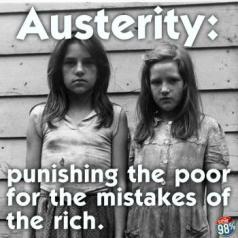From Lars Syll The EU establishment has been held to account for the euro mess, for austerity policies that turned recession into depression, for the galloping inequality, and for the millions and millions of unemployed. The EU austerity policies bread understandable and righteous anger — but also ugly far-right xenophobic political movements taking advantage of the frustration that austerity policies inevitably produce. Ultimately this underlines the threats to society that austerity policies and mass unemployment are. The neoliberal austerity policies pursued in the EU is deeply disturbing. When an economy is already hanging on the ropes, you can’t just cut government spendings. Cutting government expenditures reduces the aggregate demand. Lower aggregate demand means lower tax
Topics:
Lars Pålsson Syll considers the following as important: Uncategorized
This could be interesting, too:
tom writes The Ukraine war and Europe’s deepening march of folly
Stavros Mavroudeas writes CfP of Marxist Macroeconomic Modelling workgroup – 18th WAPE Forum, Istanbul August 6-8, 2025
Lars Pålsson Syll writes The pretence-of-knowledge syndrome
Dean Baker writes Crypto and Donald Trump’s strategic baseball card reserve
from Lars Syll

The EU establishment has been held to account for the euro mess, for austerity policies that turned recession into depression, for the galloping inequality, and for the millions and millions of unemployed.
The EU austerity policies bread understandable and righteous anger — but also ugly far-right xenophobic political movements taking advantage of the frustration that austerity policies inevitably produce. Ultimately this underlines the threats to society that austerity policies and mass unemployment are.
The neoliberal austerity policies pursued in the EU is deeply disturbing. When an economy is already hanging on the ropes, you can’t just cut government spendings. Cutting government expenditures reduces the aggregate demand. Lower aggregate demand means lower tax revenues. Lower tax revenues mean increased deficits — and calls for even more austerity. And so on, and so on.
Without a conscious effort to counteract the inevitable forces driving our societies towards an extreme income and wealth inequality, our societies crackle. It is crucial to have strong redistributive policies if we want to have stable economies and societies. Redistributive taxes and active fiscal policies are necessary ingredients for building a good society.
Societies where we allow the inequality of incomes and wealth to increase without bounds, sooner or later implode. The cement that keeps us together erodes and in the end we are only left with people dipped in the ice cold water of egoism and greed.
In a society with a huge shortage of homes, a precarious job market, and a marginalized and pressured working class, EU to a large extent becomes a question of class and inequality.
In a market economy, it is money that counts.
In a democracy, it is your vote that counts.
If you’ve got money, you vote in. If you haven’t got money, you vote out.
